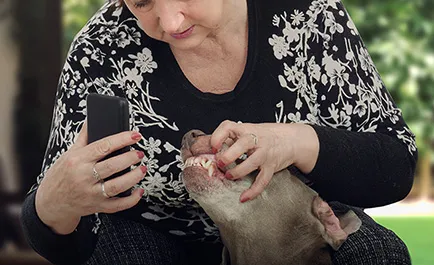Key Takeaways
- Telemedicine involves using technology to share medical information and education.
- Its benefits include efficiency, saving money, patient engagement, and remote access.
- Telemedicine may save you a trip to the vet’s office.
- Ask your vet about telemedicine services offered and the cost.
There’s been a lot of buzz about telemedicine in the human health world. As a departure from the typical approach to receiving medical care, telemedicine offers patients a way to “see” a doctor without having to take time out of a busy day to go to the doctor’s office.
Wouldn’t it be nice if our pets had the same option? In fact, they do!
What exactly is telemedicine, though? How does it work, and how can it work for our pets?
What is Telemedicine?
Telemedicine is the use of electronic communication (Skype video chats, texts, etc.) to share medical information about a patient’s (or pet’s) health status. It is a subset of telehealth, the umbrella term for all forms of technology that are used to share medical information and provide health education.
Veterinary telemedicine takes its cues from human telemedicine. Telemedicine is considered to be standard medical practice in human health, with approximately 75% of medical practitioners using it in some form. In human medical care, telemedicine provides several benefits, including those listed below:
- Improving doctors’ efficiency
- Saving patients time and money
- Increasing remote access to patients
- Improving patient engagement with their doctors
Human patients are increasingly excited about telemedicine, so it’s no surprise that pet parents are excited about it, too.
Veterinary Telemedicine
We may not realize it, but veterinarians have been using telemedicine for quite some time, albeit in its humbler form: the telephone call. Veterinarians will call pet parents to share information about a pet’s laboratory test results or recovery status after surgery, for example. Pet parents will call the veterinary office if they have a quick question about their pet, such as what to do if the dog ate a piece of chocolate.
Veterinarians also communicate with pet parents via text message, email, and even video messaging. In the future, veterinary telemedicine may incorporate more advanced forms of electronic communication, such as wearable devices for pets and “smart” litterboxes.
As with human telemedicine, veterinary telemedicine provides many benefits, including those listed below:
- Enhancing pet parent education
- Saving a trip to the veterinary office
- Improving pet parent satisfaction with veterinary care
- Improving communication between veterinarians and pet parents
Even with all of these benefits, there are several considerations, from the veterinarian’s perspective, that pet parents should know about. First, veterinary telemedicine can take place only within a ‘veterinary-client-patient relationship’ (VCPR), which is what you establish with your veterinarian during your first visit. Once that relationship is in place, your veterinarian can use telemedicine to share specific health information with you about your pet.
Without a VCPR, a veterinarian can provide only general information electronically and cannot share any specific information related to diagnosis, prognosis, or treatment. The only exception to this is an emergency, when a pet parent will need immediate medical advice for their pet until they can see a veterinarian.
Second, a veterinarian who uses telemedicine must comply with the laws and regulations governing veterinary medicine in the state in which they practice. Complying isn’t so straightforward, unfortunately, because these laws vary widely, with little consensus among states about veterinary telemedicine. The American Veterinary Medical Association has a chart that describes the laws regarding prescribing medications in relation to telemedicine.
Third, veterinarians must be selective about which cases to manage—or not manage—via telemedicine. As much as you may want to use Skype to talk with your veterinarian about your pet’s health, your vet may decide that your pet’s health status is too complex to discuss electronically.
What Can Pet Parents Do?
It’s worth talking with your veterinarian about telemedicine. If your veterinarian’s practice offers communication services beyond the usual telephone call or email, here are some questions that you can ask:
- Which telemedicine services do you offer?
- How do you charge for telemedicine services?
- Are your telemedicine services available 24/7?
- How do you protect client and patient privacy while using telemedicine?
Also, if you have pet insurance, call the insurance company to ask about whether they cover telemedicine consultations.
Bringing it Together
Telemedicine has revolutionized human medical care and has the potential to do the same for our beloved pets. Talk with your veterinarian if you are interested in exploring the use of telemedicine for the care of your pet.
Content provided by JoAnna Pendergrass, DVM. Dr. Pendergrass is owner and founder of JPen Communications, a medical communications company specializing in consumer education.
A determination to get the best vet care for your pets means you’re a great candidate for pet insurance. Find out more about dog insurance, and start by getting a free quote. Bonus: Each quote means a donation is made to pets in need.







